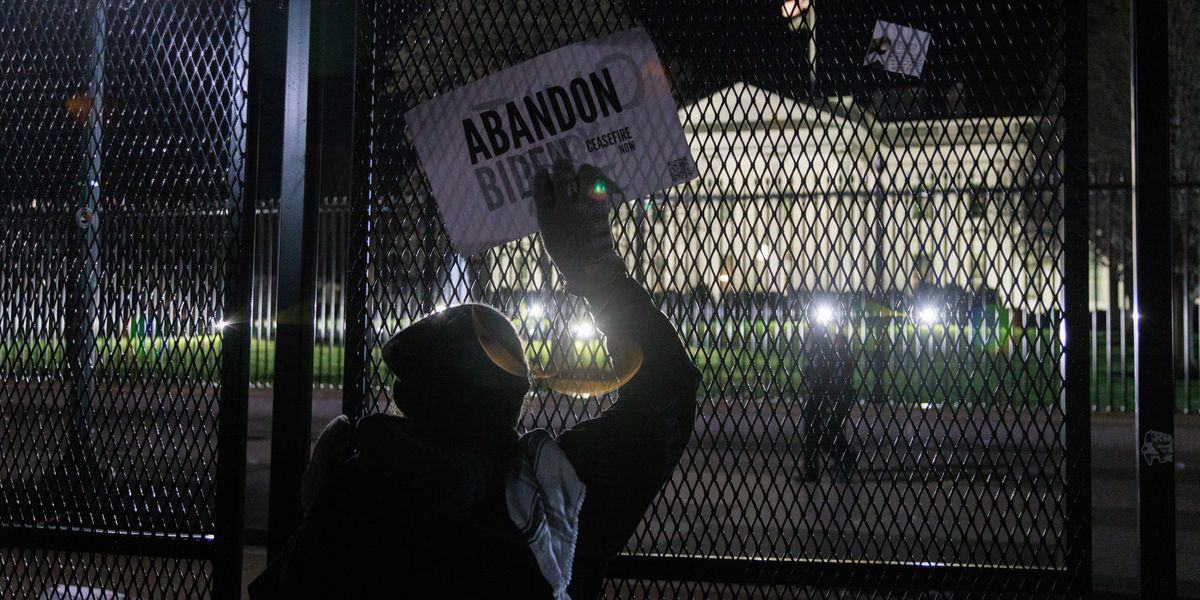The general silence around the progressive establishment as the current Democratic administration prepares to launch military strikes against more foreign targets risking a wider war in the Middle East is so depressing and disconcerting.
As deeply disturbed I am about Rep. Nancy Pelosi's (D-Calif.) recent bizarre and absurd attacks on peace advocates, I am even more distressed about the prospect of a casual stroll into an all out war against Iran in response to the militia attack on U.S. military personnel near the Jordan/Syria border over the weekend, which killed three Americans and wounded dozens more. Why U.S. troops are even there to begin with is a whole other matter.
Since Hamas’s brutal attack on Israel on October 7 and Israel’s invasion of Gaza in response, Biden administration officials and the president himself have repeatedly said they do not want the conflict to spiral out of control in the region. But in response to the attack on U.S. troops at the Jordan/Syria border, President Biden is reportedly considering “striking Iranian personnel in Syria or Iraq or Iranian naval assets in the Persian Gulf” which, if he follows through, could carry with it a tit-for-tat path of escalation that risks spiraling out of control.
Also, the Biden administration apparently does not see a link between U.S. support for Israel’s carnage in Gaza and the violence in the Red Sea and elsewhere in the region. Instead, Politico reported this week that an unnamed U.S. official “poured cold water on a pair of alternative options the U.S. could take: Reassessing troop deployments in the region and pressuring Israel to end fighting in Gaza, since that’s what has been angering the proxy groups.”
The same report, however, quoted former State Department official and international law expert Brian Finucane saying that “non-military options are likely to be more effective at bringing about an end to attacks on U.S. troops.”
Keep in mind President Biden is already on record saying that recent U.S. strikes targeting the Houthis haven’t been working. Furthermore, Qatar has already reportedly warned that U.S. retaliation to strikes in Jordan could hurt the ongoing hostage negotiations.
There have been some in the progressive foreign policy space offering sober, level-headed progressive approaches on how to diffuse the tension. For example, Matt Duss, former foreign policy adviser to Sen. Bernie Sanders, has suggested better non-military options like negotiating a new Iran nuclear deal, pushing for a legitimate two-state solution, and conditioning U.S. military aid to Israel. “Ultimately, you need to get to some kind of modus vivendi of which Iran is a part," he said.
Win Without War, a grassroots focused group that promotes progressive foreign policy, has been on point as usual with their messaging imploring President Biden to change his current course in the Middle East.
But apart from that, there are not many people speaking out from the progressive mainstream and there are very few, if any calls to action.
Meanwhile, many on the right wing are filling the void and talking the most sense about the situation at this moment. For example, Tucker Carlson called Sens. Lindsey Graham (R-S.C.) and John Cornyn (R-Texas) “f*cking lunatics” for calling on Biden to attack Iran. Former GOP presidential candidate and now Trump surrogate Vivek Ramaswamy blasted Graham and Nikki Haley for "giddily calling" for war: "It's disgusting & says a lot about the kind of GOP they're trying to recreate," Ramaswamy tweeted. And Rep. Thomas Massie (R-Ky.) piled on, asking Graham, "Is there anyone you don't want to bomb?"
This should be a four alarm fire. If I was at my old job running the political advocacy programs at CREDO Mobile today, emails would be going out lighting up the Capitol Hill switchboards trying to prevent a Democratic president from leaning even further into this maddening military conflict (which is exactly what we did a handful of times during the Obama administration).
Where is the leadership from the Left — leaders at big organizations with outsized email programs and social media assets to deploy?
What is happening? Is there anyone effectively organizing against Biden just casually leading us into another war?
I fully support an immediate and permanent ceasefire in Gaza and an immediate release of all hostages. Those two outcomes are linked. And, I admire everyone pouring their heart and soul into their advocacy to make that a reality.
But, right now, President Biden and his team are sleepwalking into a direct war in the Middle East, a course of action that will be beyond devastating and one that requires the Left’s urgent attention.















